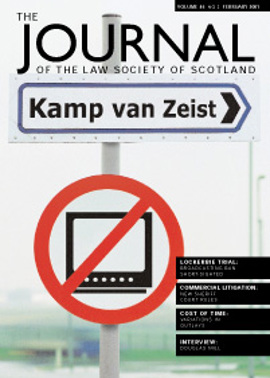Nice Summit: the road to enlargement
Reform of the Courts
One of the problems which the EU faced in relation to expansion of its borders was the workload of the European Court of Justice (ECJ) and the Court of First Instance. Both courts presently have backlogs of cases and with further areas of competence added by the Treaty of Amsterdam, it was agreed that reform was required to ensure that the courts could continue to function properly. One of the most significant changes to the courts brought about by Nice will be in relation to the Court of First Instance (CFI), which at present only deals with certain types of action. Other types of cases, such as requests for preliminary rulings under article 234 of the Treaty and cases involving any of the Member States, are reserved to the ECJ. Following Nice, for the first time, the CFI will have powers to consider requests for preliminary rulings from national courts in certain cases. Where this power will be used has yet to be decided and will be fixed at some point in the future by court rules. It does however constitute a major development in the role of the Court of First Instance. By way of safeguard, the Nice Treaty will also allow the CFI to refer requests for preliminary rulings which involve a decision of principle likely to affect the unity or consistency of Community law up to the ECJ. And, likewise, the same article of the new Treaty will allow the ECJ to review CFI cases where there is a risk of the unity or consistency of Community law being affected.
In line with its new role, the Nice Treaty also creates the new post of Advocate General to the CFI.
The other major change to the court system under the Nice Treaty is the creation of “judicial panels” which will consist of judges nominated by the Member States who will judge particular classes of cases (at the moment staff cases and trade mark cases have been specified as falling into this category). Appeals from the judicial panels will be to the CFI on both fact and law. There will be no automatic right of appeal to the ECJ, but this court will have powers of review of cases as with preliminary rulings.
Commission and Council
The issue of the change to the weighting of votes in the European Council was a controversial one and negotiations in this area were also linked to the size and make-up of the Commission and the number of MEPs per Member State in an enlarged Europe. The Nice Treaty has re-allocated votes to all present Member States and all applicant countries. The mathematics of the weighting is extremely complex but it has been recognised that the largest States had most success in this area by negotiating a position whereby, in the future, the 3 largest states acting together will be able to block the other states, even after enlargement.
As a counterbalance to their success in relation to Council voting, the large Member States have agreed to give up their second Commissioner, thus reducing the Commission to one Commissioner per Member State. The maximum size of the Commission has also been fixed at 27 Commissioners, which will allow for one Commissioner per state even if all the present applicant countries become members. If the EU grows larger than 27, there will be a rotation of Commissioners amongst the Member States. There has also been an important evolution of the influential post of President of the Commission, who will in the future be elected by a majority, rather than by unanimity which has been the case up to now, and will be given the additional power of removal of individual Commissioners
The European Parliament
The number of Members of the Parliament has been increased by the Treaty to 732 – previously it had been agreed that 700 would be the maximum workable number. This was as a result of fallout from the negotiations in relation to the Council and Commission. If there is a future enlargement, some of the large states (France, the UK and Italy) will see a reduction in the number of their MEPs whereas Germany’s position has been safeguarded as a compromise for not being allowed greater weight in Council votes than these States, despite being considerably larger than any of the Member States in terms of population.
Qualified Majority Voting
The qualified majority voting system in the Council was also under scrutiny in these negotiations and it was agreed to extend QMV to some limited areas which had previously required unanimity, such as information and consultation of workers and non-discrimination issues, in the field of employment law, and agreement on services and trade-related aspects of intellectual property. Taxation, as was widely reported at the time, remains an area where unanimity is required.
The full text of the Treaty can be found at http://ue.eu.int/cig/nice/default.asp?lang=en
In this issue
- President’s report
- The Lockerbie trial and article 10
- Sheriffs reclaim a role in commercial actions
- Why become a solicitor if you want to do banking?
- Promoting paralegals
- Code cracks unified regulation
- Substitute land and charge certificates
- Legal responsibilities for gas safety
- Robust self analysis the key to change
- Don’t trust your memory
- Nice Summit: the road to enlargement
- Book reviews
- Around the houses






